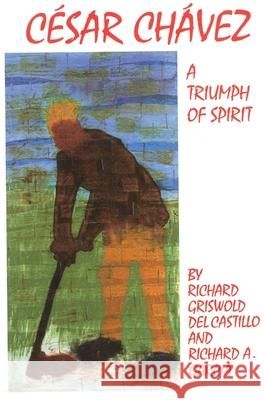Cesar Chavez, Volume 11: A Triumph of Spirit » książka
Cesar Chavez, Volume 11: A Triumph of Spirit
ISBN-13: 9780806129570 / Angielski / Miękka / 1995 / 224 str.
When farm worker and labor organizer Cesar Chavez burst upon America's national scene in 1965, U.S. readers and viewers were witnessing the emergence of a new Mexican American, or Chicano, movement. This biography of Chavez by Richard Griswold del Castillo and Richard A. Garcia is the first to approach Chavez's life-his courageous acts, his turning points, his many perceived personas-in the context of Chicano and American history. It reveals a shy, quiet man who was launched by events into a maelstrom of campesino strikes, religious fervor, and nonviolent battles for justice. Among his friends and supporters he counted Martin Luther King Jr., Robert Kennedy, Jimmy Carter, and millions across America who rallied to his cause. In Griswold del Castillo and Garcia's biography, Chavez's life mirrors major events in Mexican American history: Mexican immigration during the 1920s; forced repatriation in the 1930s; segregation in public schools; Mexican American contributions during World War II; the Zoot Suit Riots in Los Angeles; formation of Mexican American organizations to advance civil and political rights; the Chicano movement of the 1960s and early 1970s; the emergence of a conservative political backlash in the 1980s; and, finally, the "new immigration" in the 1990s. Cesar Chavez was touched by all these events, and his story is both private and part of a collective experience. Ultimately the authors see Chavez's significance as moral. In an age notable for its confusion about-if not lack of moral values, Cesar Chavez stands as proof that America still has people of rare courage and conviction who devote their lives to a righteous cause, to self sacrifice and nonviolent struggle against overwhelming odds. Chavez consistently respected all ethnic and religious groups, rejected materialism, and, above all, fought for justice. Griswold del Castillo and Garcia's biography tells the inspiring story of a man who lived a simple life and preached a simple guiding dictum: Si Se Puede-Yes, it can be done.
"Griswold del Castillo and Garcia have written a biography of Chavez, but it is also a history of the Mexican American labor movement and the Mexican American struggle for civil rights....[T]his is a fine book."--- Choice"[D]eserves to be read not only by persons studying the Mexican American experience but also by those interested in labor studies, U.S.-Mexican relations, and U.S. civilization in the 1960s and 1970s, including politics and society."--- Western Historical Quarterly"Intended for scholars and general readers alike, the fascinating life story reads like a novel....[T]his sorely needed biography updates all the others."--- Multicultural ReviewWhen farm worker and labor organizer César Chávez burst upon Americas national scene in 1965, U.S. readers and viewers were witnessing the emergence of a new Mexican American, or Chicano, movement. This biography of Chávez by Richard Griswold del Castillo and Richard A. Garcia is the first to approach Chávezs life-his courageous acts, his turning points, his many perceived personas-in the context of Chicano and American history. It reveals a shy, quiet man who was launched by events into a maelstrom of campesino strikes, religious fervor, and nonviolent battles for justice. Among his friends and supporters he counted Martin Luther King Jr., Robert Kennedy, Jimmy Carter, and millions across America who rallied to his cause.In Griswold del Castillo and Garcias biography, Chávezs life mirrors major events in Mexican American history: Mexican immigration during the 1920s; forced repatriation in the 1930s; segregation in public schools; Mexican American contributions during World War II; the Zoot Suit Riots in Los Angeles; formation of Mexican American organizations to advance civil and political rights; the Chicano movement of the 1960s and early 1970s; the emergence of a conservative political backlash in the 1980s; and, finally, the "new immigration" in the 1990s. César Chávez was touched by all these events, and his story is both private and part of a collective experience.Ultimately the authors see Chávezs significance as moral. In an age notable for its confusion about-if not lack of moral values, César Chávez stands as proof that America still has people of rare courage and conviction who devote their lives to a righteous cause, to self sacrifice and nonviolent struggle against overwhelming odds. Chávez consistently respected all ethnic and religious groups, rejected materialism, and, above all, fought for justice. Griswold del Castillo and Garcias biography tells the inspiring story of a man who lived a simple life and preached a simple guiding dictum: Si Se Puede-Yes, it can be done.Richard Griswold del Castillo was born and raised in Santa Ana California; his father was born in Minneapolis Minnesota and his mother was born in Mexico City, Mexico. He graduated from Santa Ana High school in 1960, went on study at UC Berkeley and the University of Dijon, France before receiving his B.A., M.A., and Ph.D. from UCLA . In 1992 he was a Fulbright Scholar in Mexico City, he was a visiting professor at UC Berkeley in 1994, and he became Professor Emeritus at San Diego State University in 2005.Richard A. Garcia, Professor of Ethnic Studies at California State University-Hayward, is the author of The Rise of the Mexican American Middle Class: San Antonio, 1929-1941.











